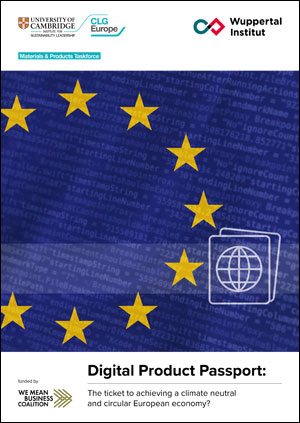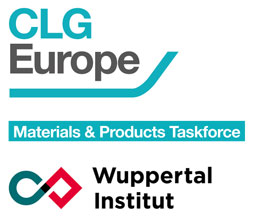12 July 2022 - The European Commission recently released its March Circular Economy Package, which includes a proposal for an Ecodesign for Sustainable Products Regulation (ESPR). The ESPR sets a Digital Product Passport (DPP) as a key regulatory element enhancing the traceability of products and their components. The Materials & Products Taskforce and the Wuppertal Institute has released its new report, building on business insights, on how a well-designed DPP could enabled climate action and enhanced circularity in the EU.
Download the report here.
Watch the launch event recording here.
About the report
The new report explores the benefits of digital product passports to store and share information throughout a product’s life cycle and finds the system could be key to helping consumers make better-informed choices and incentivising producers to increase the sustainability of their products.
The analysis based on business insight argues a product passport system would provide industry stakeholders, businesses, public authorities, and consumers with a better understanding of the materials used in the product as well as their embodied environmental impact.
In the context of the COVID-19 pandemic, the Russian invasion of Ukraine and the cost-of-living crisis, the report suggests it is critical to transform economic and business models, while addressing the huge scale of material consumption and related emissions. In addition, the report concludes Digital Product Passports (DPPs) can accelerate the twin green and digital transitions as part of EU efforts to deliver positive climate action and sustainable economies.
Key takeaways:
The introduction of the DPP would deliver a range of benefits including:
- Access to reliable and comparable product sustainability information for businesses and policymakers, and also information to address product liability challenges more broadly.
- Access for consumers to information that enables them to make more informed and sustainable choices.
- Increased transparency, traceability and consistency for each player in each part of the value chain.
- Support for companies to monitor and report against sustainability indicators and claims through a digital tool.
- A tool that can facilitate innovative thinking on circularity and new practices.
- Potentially an enabler for the development of completely new business models.
- New data sources that can enable sustainable investment decisions.
- Enabling resource optimisation as well as energy efficiency strategies.
For a well-designed DPP the report’s recommendations are that it should be based upon the principles of:
- coherence and consistency;
- flexibility and exploration of design;
- transparency and accountability.
Eliot Whittington, Director of Policy, University of Cambridge Institute for Sustainability Leadership said: “The war in Ukraine is underlining that it is essential that we live within our means and find ways to be more geopolitically independent with our materials in Europe. A well-designed Digital Product Passport will be an invaluable policy and business tool in support of this goal, as it will enable businesses to create more sustainable and circular materials and products by monitoring how they are made throughout the supply chain. It will also support consumers to make well-informed choices based upon sustainability criteria. This could be game-changing in the effort to build a European circular economy.”
Prof. Dr.-Ing. Manfred Fischedick, Scientific Managing Director of the Wuppertal Institute said: “The EU fosters digitalisation and the transformation towards a climate-neutral, sustainable economy and describes this parallel process as the green and digital ‘twin’ transition. A Digital Product Passport (DPP) as envisaged in the EU’s European Green Deal and Circular Economy Action Plan is a great opportunity to modernise product information throughout the entire value chain. DPPs could be a big step forward for more sustainable products and consumption, boosting energy and resource efficiency by enabling new business models based on e.g. digital data sharing. DPPs could also substantially contribute to an improved security of energy and material supply for a resilient economy.”
María Mendiluce, CEO, We Mean Business Coalition said: “Businesses are diving deeper into their supply chains to deliver on their science-based targets and creating a more circular economy. Reliable and comparable data for materials and products is critical. The EC through harmonized standards for Digital Product Passports can create a level playing field for climate action and innovation. I commend the Materials & Products Taskforce for providing the business perspective on how to maximize the utility of DPPs, and contributing to more business friendly EC standards and policies.”
Bjørn Kjetil Mauritzen, Head of Group Sustainability, Hydro said: “As a firm believer in the value of data driven decision making, Hydro sees the development of digital product passports (DPP) as an initiative that can be useful tool for a wide variety of reasons. If successful, and executed correctly, it will provide us with the ability to gather data on a product and its supply chain and share it across entire value chains so all actors, including consumers, have a better understanding of the materials and products they use and their embodied environmental impact. In turn, this may support and accelerate a range of positive outcomes for both Hydro and society at large and could enable greater circularity in Europe.”
Anthony Abbotts, Director of Group Sustainability and Public Affairs, ROCKWOOL Group said: “The introduction of different regulatory tools within circularity are critical to support our efforts in achieving a net-zero carbon economy. One such tool is the Digital Product Passport (DPP) which helps to ensure green claims are credible while further boosting market surveillance. For DPP to succeed third party verification of data is key to ensure transparency across a wide range of materials and products."
Harry Verhaar, Head of Global Public & Government Affairs at Signify and Chair of CLG Europe, said: “Building stronger on digital solutions as enablers, Europe has the opportunity to unlock transformative change towards a more sustainable and circular economy. A Digital Product Passport (DPP) that is fit-for-purpose can pave the way for creating more synergies between digital, climate and circular economy policies. This DPP will help public and private sector in their sustainable decision making and will foster the certainty needed for businesses to scale up their actions on climate and circularity.”
Sascha Bloemhoff, Niaga®, Marketing Director said: “This report gives an essential overview of how an EU Digital Product Passport (DPP) can be a critical enabler of the transition to a circular economy and transform waste streams into material streams. Niaga® is proud to have contributed our real-life experience. The Niaga® tag and DPP platform for transparency and return is already operational. Our proven formula for success that the EU DPP can learn from: start simple and swiftly, build it out over time, and focus the first step on ingredient transparency - as this is the only way to assess a product’s recyclability and its impact on personal and environmental health.”
Bernhard Osburg, CEO thyssenkrupp Steel Europe AG said: “Decarbonization of steel is a unique opportunity while also a transformational challenge. We plan to invest in 2 direct reduction plants in Duisburg by 2030. The first plant is scheduled to go into operation in 2026 and offer green steel to our customers. The Digital Product Passport could become a tool to communicate the carbon footprints of materials and products to consumers. To create a well-designed tool, a DPP should be developed in close collaboration with the business community.”





